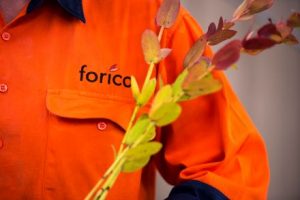
Three superannuation companies have purchased Tasmania’s largest private forest management company Forico which was created by global investment group New Forests to manage 173,000 hectares of forest after acquiring it from Gunns in 2013. Source: Timberbiz
Under the agreement, the three investors – Australian superannuation fund UniSuper, the UK’s Pension Protection Fund (PPF), and APG Asset Management N.V (APG) on behalf of its Dutch pension fund client ABP – will each own 33% of Forico and the forestry estate. New Forests will be retained to provide investment management services.
It also includes two wood processing mills, a seedling nursery and a technology laboratory.
UniSuper already has three other forestry plantations, that mostly contain faster-growing softwoods, one in Victoria – HVP Plantations – and two more in New Zealand that are cumulatively worth around $1 billion.
The Financial Review reported that the sale of Forico was sparked by the winding down of a 10-year closed ended fund managed by New Forests.
PPF, which had a stake in the fund as well as a separate co-investment, exercised a pre-emptive right to buy Forico and brought in UniSuper and APG as co-investors.
Financial details of the transaction are confidential.
“Investing in the forestry asset class provides an opportunity to deliver strong returns for our pension fund client ABP and its participants, while contributing to sustainable development goals around climate action, improving livelihoods and sustainably managing land. We’re looking forward to our continued involvement with this market-leading vertically integrated sustainable forestry business,” Hans-Martin Aerts, Head of Infrastructure & Natural Resources at APG Asset Management Asia said.”
Alex Leonard, Head of Infrastructure, Timberland & Farmland at the Pension Protection Fund (PPF) said forestry was an important asset class for the PPF and this direct investment further underpinned the fund’s commitment to investing responsibly.
“Our focus on using our funds in these longer term productive investments, in both UK and global markets, is important for sustainable growth and productivity,” he said.
“We are particularly attracted to the strong growth prospects for hardwood fibre, and Forico’s position at the forefront of advances in silviculture, the circular bioeconomy and natural capital. Adding this high quality, well-managed asset to our existing timberland portfolio benefits those who rely on us through strong investment returns while delivering tangible, long-term environmental benefits. Everyone wins.”
Sandra Lee, Head of Private Markets at UniSuper said the fund was delighted to be investing in an asset of this scale and quality.
“This adds further momentum to our growing private markets and forestry portfolios, as we continue to be on the lookout for quality investments that help our members grow their retirement savings over the long term,” she said.
“Not only is forestry a portfolio diversifier, but it also supports the global transition towards decarbonisation through carbon storage as well as substitution to sustainable timber material. We look forward to working closely with New Forests and our co-investors as we further develop this asset.”
Forico is Tasmania’s largest private forest management company. The forestry estate is one of Australia’s largest plantation hardwood estates by productive area and consists of vertically integrated assets and operations spanning approximately 90,000 hectares of productive plantation forest. It also owns key infrastructure along the supply chain consisting of two wood processing mills, a seedling nursery, fibre technology laboratory, and port access via a freehold facility at Long Reach, Tasmania.
The estate is the largest freehold land estate in Tasmania and a key contributor to the supply of sustainable hardwood domestically and abroad for end uses such as packaging and tissues.
“Attracting and retaining long term investment partners in UniSuper, PPF and APG helps to secure a prosperous future for Forico and the forestry industry,” Forico CEO Evangelista Albertini said.
“It will allow us to continue to innovate, adopt market leading practices, and look at ways to add value to the natural environment.”
In 2013, a New Forests’ managed entity acquired the estate with co-investors, and over the past decade, working closely with Forico, has helped to transform the asset into what is today one of Australia’s leading sustainable timber producers.
Forico’s market leading approach to valuing natural capital and sustainability reporting has demonstrated that the estate is sequestering more than 123 million tonnes of CO2e. The current plantation rotation is expected to remove from the atmosphere and sequester a further 24.7 million tonnes before it is harvested and replanted for another rotation.
In December 2022, Forico became the first forestry manager in Australia to achieve FSC Ecosystem Services certification for its approach to protecting the biodiversity values across its estate.
“We have a long history with this asset in Tasmania and are delighted to bring together like-minded, long-term partners to support the future of forestry in Australia,” Mark Rogers, Chief Executive Officer, New Forests and Chair of Forico said.
“We’ll be looking at ways to add further value, harnessing the growth in the circular bioeconomy, carbon projects, natural capital and biodiversity markets.”
Australian Forest Products Association acting CEO Natasa Sikman said the sale sent a clear signal to Government and future investors both in Australia and globally about the world class sustainable management practices in Australia.
“It is wonderful to see that New Forests will continue to be the investment manager and that they will be looking at ways to add further value by harnessing the growth of the circular bioeconomy, carbon projects, natural capital and biodiversity markets,” she said.
The announcement of the acquisition adds to the important discussions held this week at the Asia-Pacific Forestry Commission (APFC), where Forestry Minister Murray Watt heralded the importance of the bio-circular economy and the forest products sector’s role in tackling climate change.





